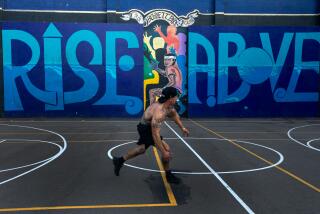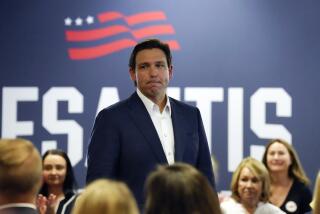Policeman Trades an Idea for Better Black Awareness
- Share via
When San Diego Police Officer Matt Weathersby starts talking about the civil rights movement, questions and answers come flying a mile a minute.
“Do you know where the phrase ‘separate but equal’ comes from?” he’ll ask.
“Do you know which African-American attorney argued before the Supreme Court in Brown vs. Board of Education?”
The answers--the 1896 case of Plessy vs. Ferguson and Thurgood Marshall--can be found on Weathersby’s civil rights trading cards.
The idea to produce trading cards featuring key players, both black and white, in American civil rights history came shortly after a February meeting between Weathersby and Rosa Parks, whose refusal to move to the back of a bus in 1955 sparked the civil rights movement.
After meeting with her and evaluating his and his family’s limited knowledge of the movement, Weathersby said he knew that he had to act. So he produced a line of flash-type cards with black-and-white photos on the front and brief biographical or historical information on the back. In tribute to Parks, the first card in his 35-card set is about her.
The cards are a family affair for Weathersby, 37, his wife of 12 years, Sedonia, and their three children, Aaron and Matthew, 11, and Michael, 7.
In fact, according to Weathersby, the idea of making trading cards came from his two older sons, both avid baseball card collectors.
“My kids like the action-adventure stuff,” he said. “They love baseball cards.”
Switching the emphasis from promoting athletes on cards to prominent African-Americans was applauded by some local educators.
“The role models that these cards promote are very important because children need to have a model to identify with,” said Agin Shaheed, a pupil advocate for San Diego city schools. “Right now there aren’t enough positive African-American models outside of sports and entertainment.”
The card format, with its pictures and concise information, makes learning fun for children, Weathersby said.
“The cards are not enough by themselves (to educate), but they could be a good learning tool for stimulating discussion,” said John Browne, an instructional adviser in the humanities for San Diego schools. “Some of the things in (the cards) are beyond the realm of the textbooks. The cards can serve as an entree to learning more.”
The San Diego Unified School District has not purchased the cards, Browne said, but several members of the district’s special African-American advocacy program have responded positively to the cards.
Weathersby says the educational experience for his family is more important than any money he stands to make from the cards.
“At this stage we’re having fun and we’re learning,” said Weathersby, who tapped out his credit cards to finance the venture. “I’d like to be rich like the next man, but some other things are more important.”
He and his wife will donate 10 sets of the cards to the 93rd Street Elementary School in South-Central Los Angeles next week. The school is his wife’s alma mater and will be the first in the nation to have the cards, Weathersby said.
Although he hasn’t started to market his cards, Weathersby said he hopes to launch four more sets within the next few months. They will focus on the contributions of African-American soldiers, scientific discoveries and inventions by blacks, artistic contributions by African-Americans to American culture and African-American women who have helped shape American society.
More to Read
Go beyond the scoreboard
Get the latest on L.A.'s teams in the daily Sports Report newsletter.
You may occasionally receive promotional content from the Los Angeles Times.










